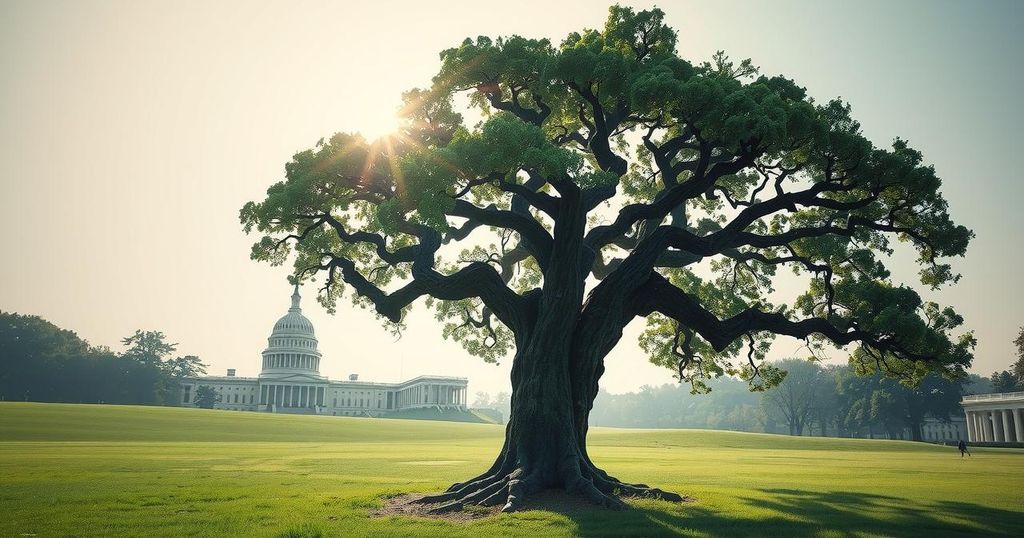Cameroon: President Paul Biya’s Potential Eighth Term in Question
As Cameroon prepares for elections, President Paul Biya, 91, may seek an eighth term, further extending his record as Africa’s longest-serving leader. Despite health concerns and ongoing civil unrest, his party displays strong support for him, while opposition groups face challenges in presenting a viable alternative. Economic conditions remain precarious, complicating the prospect of effective governance in the years to come.
As Cameroon approaches its upcoming elections, 91-year-old President Paul Biya is likely to be a candidate for an unprecedented eighth term, affirming his status as Africa’s longest-serving leader. Dr. John Akpo, a political analyst, indicated that Biya’s party has shown substantial support for his continued candidacy despite growing health concerns surrounding the president.
Biya has governed Cameroon for over 42 years, and should he win another election, he would be 99 years old for the 2032 elections. Although some opposition factions express support for him, skepticism remains regarding their intentions, with Akpo labeling these groups as creations of the ruling party designed to undermine genuine opposition movements.
While Biya is acknowledged for initiating multi-party democracy and strengthening ties with Western nations, his leadership coincides with a civil war instigated by Anglophone separatists. As his age appears to hinder his capacity to address this ongoing crisis effectively, opposition figures suggest his inability to engage with affected regions firsthand has not been conducive to resolution efforts.
The ruling Cameroon People’s Democratic Movement (CPDM) relies heavily on its coalition with the Democratic Movement for the Defense of the Republic (MDR) and Union of the Populations of Cameroon (UPC) to sustain parliamentary dominance. Despite their waning electoral influence, these parties remain vital to Biya’s government, particularly in countering opposition figures like Maurice Kamto, who is seen as a potential successor.
Recent discussions led by Catholic bishops highlighted the political circumstance in Cameroon, urging improvements in living conditions without directly calling for Biya’s resignation. Their insights carry weight amongst the predominantly Catholic populace, emphasizing the necessity for peaceful coexistence between church and state amid political discourse.
The economic landscape in Cameroon has faced challenges, with growth slowing to 3.3% in 2023 due to factors like inflation and internal conflict. Despite slight recovery in early 2024, poverty remains high, with 23% of the population living below the international poverty threshold. Widespread corruption continues to cripple state functions, prompting concerns about the ability of Biya’s administration to foster meaningful economic reform.
Cameroon struggles with various systemic inadequacies, which impede infrastructure development and connectivity. Analysts emphasize the need for substantial progress in these areas, yet with an opposition that remains fragmented and ineffective, there are doubts about the prospects of meaningful change under another Biya term amid calls for stability by certain sectors of the populace.
Cameroon, a nation grappling with political and economic challenges, has been under the long-term leadership of President Paul Biya. As the political climate evolves, discussions surrounding his potential eighth term prompt examination of the effectiveness of his governance amid civil unrest and economic strife. Understanding the current dynamics of Biya’s administration, opposition movements, and the broader socio-political landscape is essential for grasping the impending elections’ implications.
President Paul Biya’s potential re-election raises substantial questions about the future of Cameroon’s political and economic landscape. As the longest-serving leader in Africa, his administration’s ability to address ongoing crises, foster economic growth, and respond to the demands of a discontent populace remains a significant concern. With a divided opposition lacking clear alternatives, the continuity of Biya’s rule appears likely despite the critical challenges that lie ahead.
Original Source: www.dw.com




Post Comment